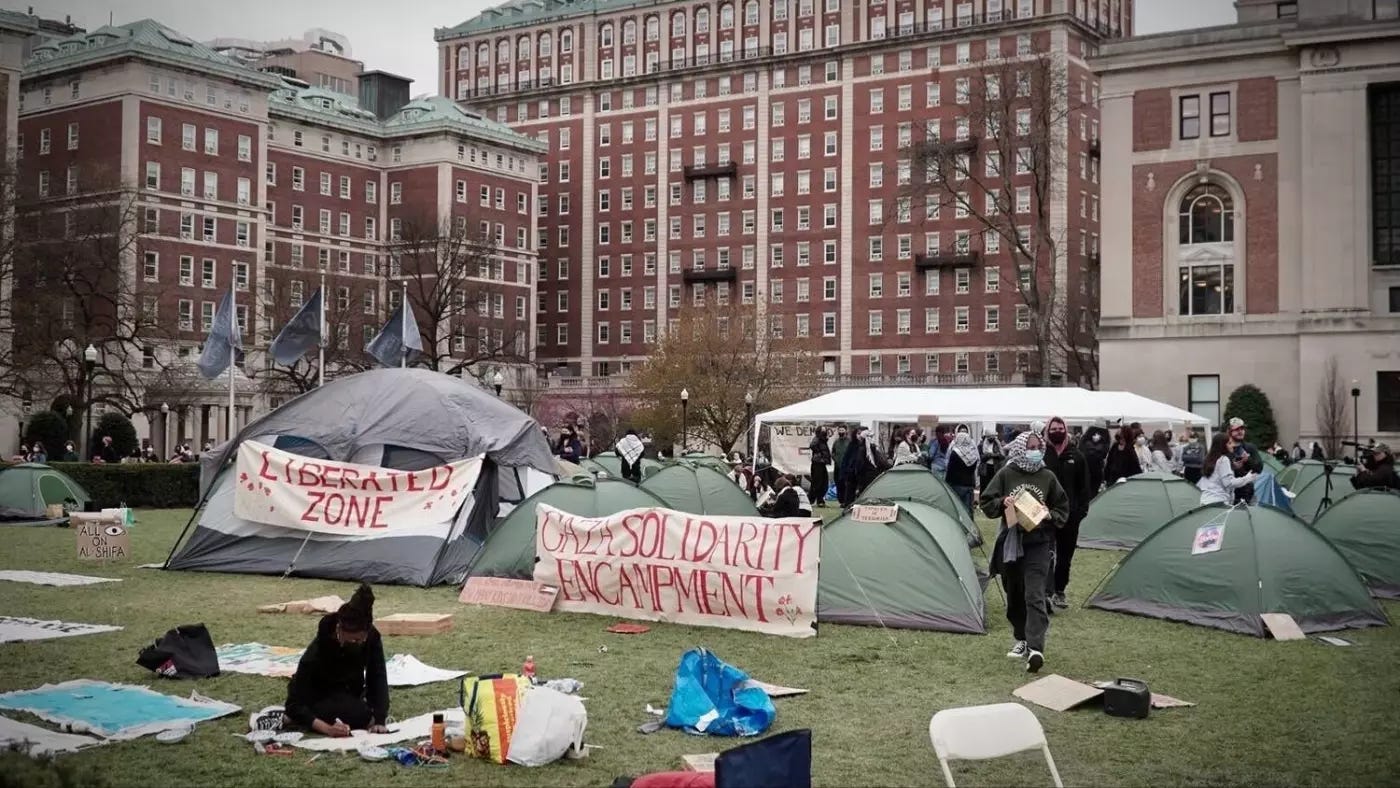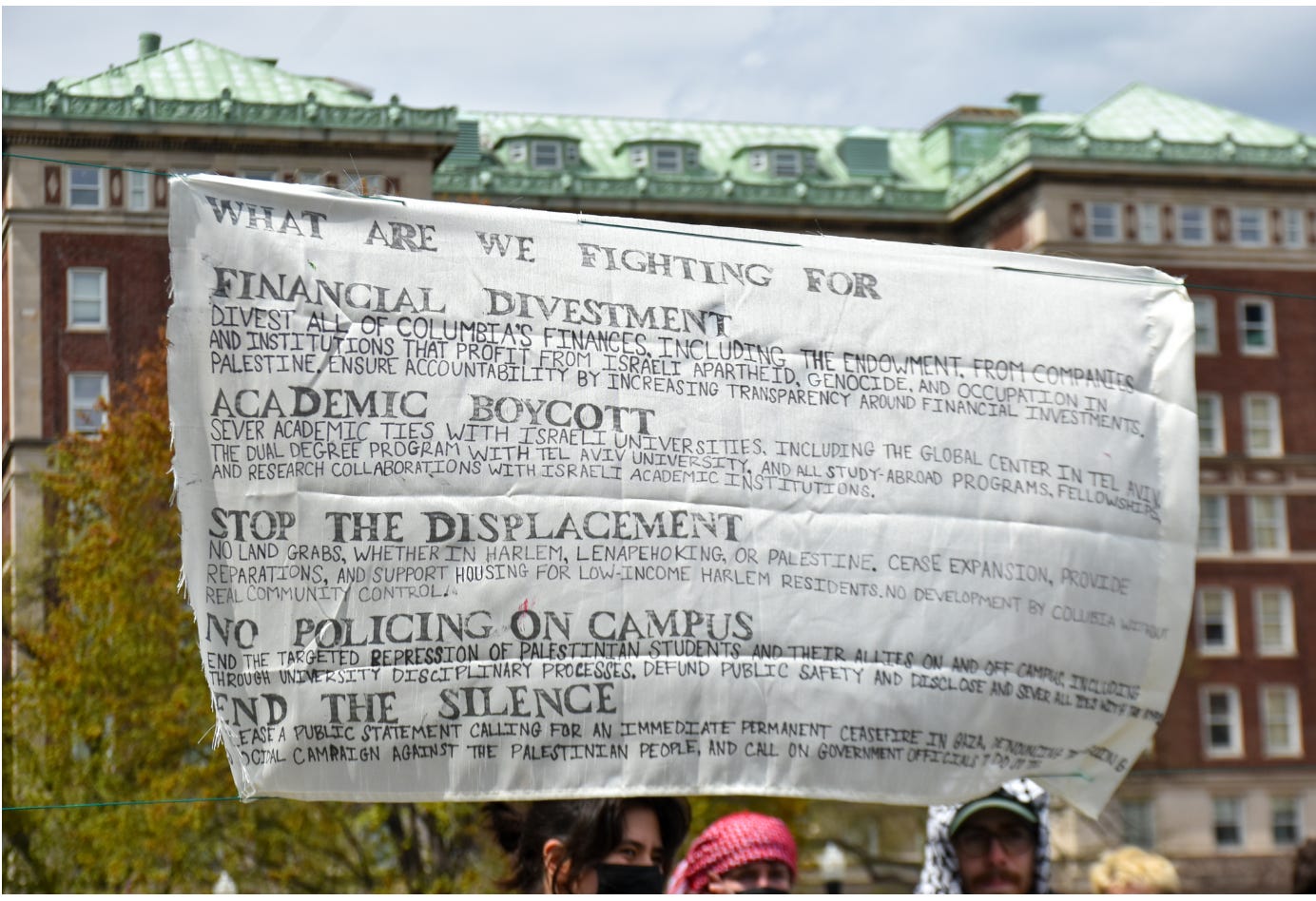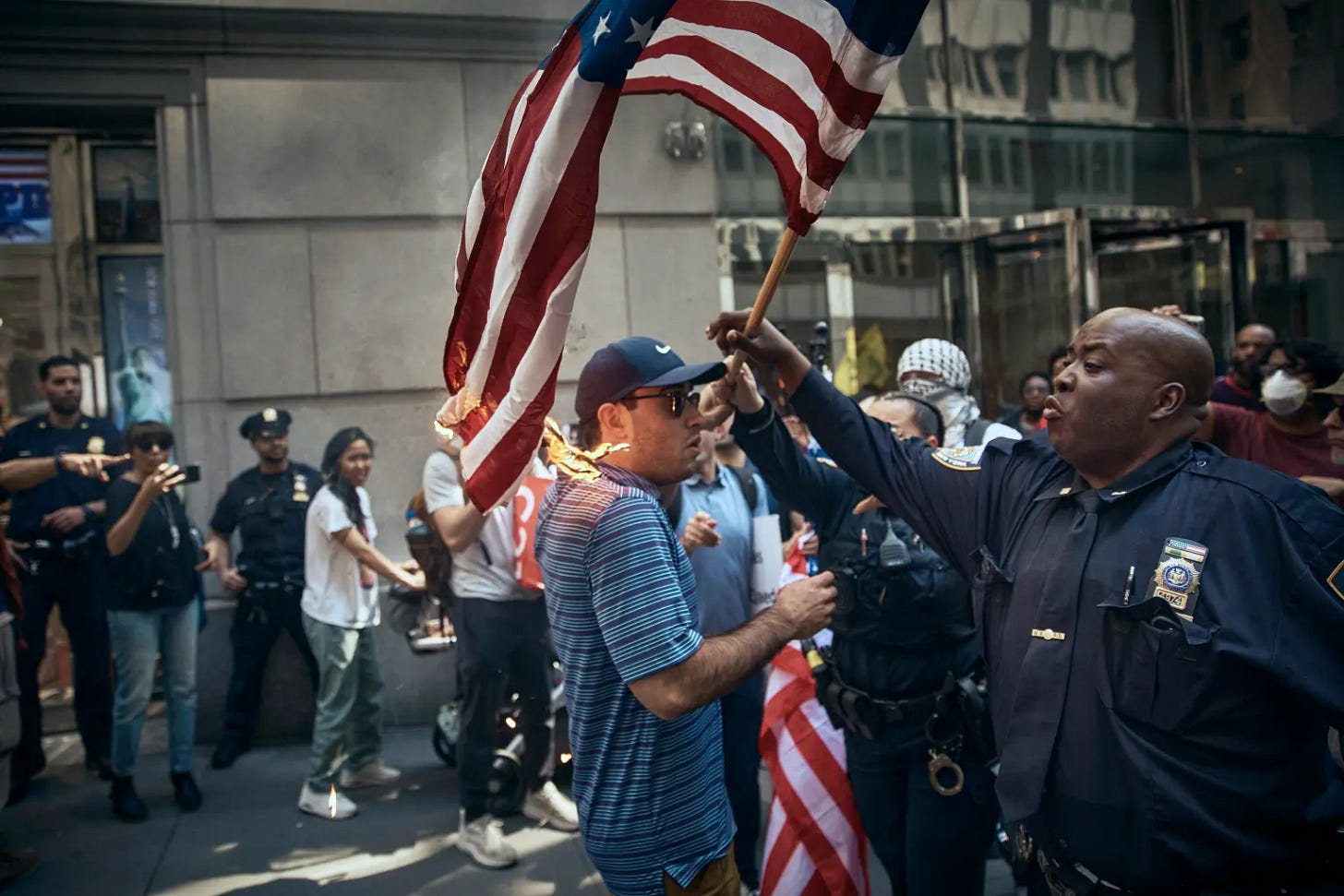There is no substitute for conversation with smart people to clarify one’s ideas. That happened with me today with a longtime colleague, Rick Dunham. A global educator and accomplished journalist, he thinks deeply on things and shed some light on an issue that troubles me greatly – anti-Israel demonstrations at one of my alma maters, Columbia University.
As has been widely reported, Columbia has been a hotbed of pro-Palestinian (indeed, pro-Hamas) agitation. Students and sympathizers have occupied part of the campus, setting up the “Gaza Solidarity Encampment” to demand that the school disinvest in companies linked to Israel and boycott Israel academic institutions, as well as removing police from the campus – the latter because the NYPD arrested 108 people in a sweep of the camp a bit ago, as requested by university President Minouche Shafik.
The demonstration has been condemned in several quarters. The Wall Street Journal, for instance, editorialized that the “protesters are fully entitled to express their view that Israel is pursuing genocide in its war with Hamas. But what the country saw Thursday at Columbia wasn’t about free expression. As President Shafik pointed out, the protest was about disrupting campus life for everyone else and creating ‘a harassing and intimidating environment for many of our students.’”
Such protestors, the WSJ argued, only “show contempt for the rights of those whose lives they disrupt.”
Even the White House weighed in, unsettled by threats against Jews on the campus. “While every American has the right to peaceful protest, calls for violence and physical intimidation targeting Jewish students and the Jewish community are blatantly antisemitic, unconscionable, and dangerous – they have absolutely no place on any college campus, or anywhere in the United States of America,” White House deputy press secretary Andrew Bates told The Times of Israel. “Echoing the rhetoric of terrorist organizations, especially in the wake of the worst massacre committed against the Jewish people since the Holocaust, is despicable. We condemn these statements in the strongest terms.”
Some of that rhetoric has been ugly indeed. “[Izz ad-Din] Al-Qassam [Brigades], make us proud, take another soldier out,” anti-Israel demonstrators chanted on Friday night in a video published on social media by pro-Palestinian activist ThizzL, as reported by The Jerusalem Post. “We say justice, you say how? Burn Tel Aviv to the ground. Go Hamas, we love you. We support your rockets too.”
And the verbal heat moved to action in at least one case. A Jewish Columbia student, 21-year-old Elisha Baker, was told to "kill yourself" and repeatedly kicked in the stomach during the protest on Monday, according to the New York Post. A demonstrator even set fire to the American flag Baker was carrying. A 19-year-old was arrested for assault in the case.
Concerns among Jews have grown so worrisome that the university’s Orthodox rabbi urged more than 290 students at Columbia and Barnard to go home until the unrest abates, according to National Review. “The events of the last few days, especially last night, have made it clear that Columbia University’s Public Safety and the NYPD cannot guarantee Jewish students’ safety in the face of extreme antisemitism and anarchy,” Rabbi Elie Buechler wrote. “It is not our job as Jews to ensure our own safety on campus.”
So, to Rick’s clarifying thoughts. He and I agreed that protest is entirely appropriate on university campuses. Speech must be free in classrooms and on campus grounds, perhaps even more so than in other venues, as people should be able to challenge one another intellectually.
However, where he draws the line is on hate – propagating it against groups or individuals is beyond the pale.
I quite agree. Much of the speech by the pro-Palestinian groups is foul. Posters saying “by any means necessary,” implying that murder, kidnapping and rape are acceptable, are simply reprehensible. So, too, are any comments endorsing any actions by the sadistic terrorist group. Such language should be condemned at every turn.
But should even such sentiments be banned? Would the noxious ideas disappear if discussion of them were simply barred on campus? Indeed, is there something illuminating about seeing such thoughts expressed – if only to show us how sorely in need of education the speakers are, in revealing their ignorance and bringing to light a problem professors must remedy in the classroom?
No doubt, there are lines that cannot be crossed. When groups chant “from the river to the sea, Palestine will be free,” are they not calling for the extermination of Jews? When groups expressly support Hamas, is that not akin to supporting Nazis — people whom no civilized academic community could tolerate? It’s one thing to argue that military action against Gaza should stop; it’s another to endorse a group sworn to destroy Jews.
Such sentiments need to be recognized for the antisemitic notions they are. And they cannot be left unanswered even as that means aggressive campus disciplinary action. Certainly, no responsible academic would tolerate open anti-Muslim comments and actions and would subject the speakers to censure or worse; such should be the same for any sort of Jew hatred.
Many of the students arrested in the recent sweep of the camp may be suspended in ways that will stop them from finishing the current term. That may be appropriate in some cases. Certainly, violence cannot be countenanced and expulsion might be suitable there.
But I suggest another route for some of the protestors: I suggest that courses be set up, to be taught jointly by pro-Israel and pro-Palestine profs committed to peaceful coexistence, and that students who violate university policies be required to attend such courses. In them, they could learn the history of the conflict, review the legitimate claims on the land of Israel by Jews and Arabs, and examine various government policies, both by Israeli and Arab governments. They could learn about efforts by people on both sides to promote peace.

Such educational efforts have worked well on other campuses. Dartmouth, for instance, has long offered such schooling.
The arguments the students are now making – some of which are stunningly ignorant of which river and which sea their chant refers to – could be conducted civilly and respectfully in classrooms. Debates about the Mideast have at least two sides, perhaps more, and they could be fully aired in a setting of tolerance and respect.
Indeed, if I had the chance, I would argue to the students that they should be calling for a cessation of hostilities in the most reasonable way possible — for Hamas to lay down its arms and to show compassion for long-suffering Palestinians by seeking peaceful coexistence. It’s appalling that the demonstrators aren’t making such demands on the group and instead seem to accept its suicidal and murderous approach.
Is the idea of mandatory schooling in the issues naïve? Or would it take some of the heat out of the overheated situation now at Columbia?
It’s likely that the most militant students would dismiss such schooling, seeing it as propagandistic indoctrination. But, if students in the Ivy League school are as bright as they were when I was in graduate school there, many would likely relish the chance to learn more, to feel challenged – in appropriate ways. And, if they didn’t, well, perhaps the university would be better off without them. They could be invited to leave the campus for good.
Rick and I may not agree on everything, and that’s okay. Frankly, that’s true of me and some of my closest family members. Still, we respect one another, and the chance for civil conversation lets us all learn. Isn’t that also what university educations are all about? Isn’t that why students are at schools such as Columbia?







